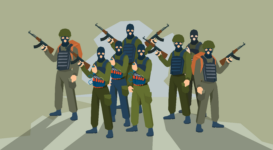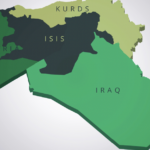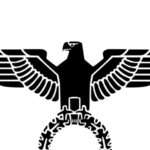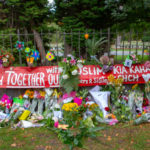Which Groups Does Australia List as ‘Terrorist Organisations’?

The Criminal Code Act 1995 (Cth) prescribes a range of offences relating to terrorists acts and associated conduct.
A number of those offences relate to groups that are classified as ‘terrorist organisations’.
Offences relating to terrorist organistions
Offences that relate to terrorist organisations include:
- Directing the activities of a terrorist organisation, section 102.2 Criminal Code Act, up to 25 years in prison,
- Membership of a terrorist organisation, section 102.3, up to 10 years in prison,
- Recruiting for a terrorist organisation, section 102.4, up to 25 years,
- Training a terrorist organisation, section 102.5, up to 25 years,
- Funding a terrorist organisation, section 102.6, up to 25 years,
- Providing support to a terrorist organisation, section 102.7, up to 25 years, and
- Associating with a terrorist organisation, 102.8, up to 3 years.
Who decides whether a group is a terrorist organisation?
The Minister for Home Affairs is tasked with deciding whether a group is listed as a terrorist organisation.
To list a group as such, the Minister must be satisfied on reasonable grounds that the organisation:
- Is directly or indirectly engaged in preparing, planning, assisting in or fostering the doing of a terrorist act; or
- Advocates the doing of a terrorist act.
In making that determination, the Minister may consider:
- The organisation’s engagement in terrorism,
- The organisation’s ideology,
- Links to terrorist groups,
- Links to Australia,
- Threats to Australian interests,
- Listing by the United Nations or by like-minded countries, and/or
- Engagement in peace or mediation processes.
Which groups are currently listed as terrorist organisations?
Australia currently classifies the following 29 groups as terrorist organisations:
| Name of organisation | Date listed as a terrorist organisation | Details of organisation according to Australian government |
| Abu Sayaff Group | 14 November 2002 | Abu Sayyaf Group (ASG) is a Sunni Islamist religiously-motivated violent extremist (RMVE) group, which was founded in 1991 after splintering from the Moro National Liberation Front (MNLF). ASG primarily operates in the southern Philippines, but maintains a presence in eastern Malaysia. ASG’s objective is to establish an Islamic state in the southern Philippines, and the group has historically aligned itself with listed terrorist organisations al Qa’ida and Jemaah Islamiyah. |
| Al-Qa’ida (AQ) | 21 October 2002 | Al-Qa’ida (AQ) is a Sunni Islamist religiously-motivated violent extremist (RMVE) group, which seeks to establish a transnational Islamic caliphate by removing, using violence as necessary, governments in Muslim-majority countries that it deems ‘un-Islamic’. The group’s overall aim is to replace these governments with Sharia-based Islamic governance in an attempt to supplant foreign influence. To achieve this, the group supports Islamist causes in various global conflicts. Al-Qa’ida views the United States (US) and its allies, including Australia, as enemies and a significant obstacle to achieving its objective.
AQ was founded by Usama bin Laden and Abdullah Azzam in 1988, to continue their jihad against perceived enemies of Islam following the Soviet withdrawal from Afghanistan. Bin Laden gained full control of the organisation after Azzam’s death in 1989. During the 1990s, AQ developed a global network of affiliates to secure a cadre of fighters to promote global jihad. AQ cultivates influence over affiliates and assigned groups by incorporating local grievances into their global strategy and consulting with the leaders and deputies of its global affiliates. Education and religious outreach, exploitation of local insurgencies, and a terrorist campaign against the ‘far enemy’ – primarily Western countries – remain AQ’s long-term objectives. Sustained counter-terrorism pressure has weakened the group, which has conducted fewer attacks against Western countries since 11 September 2001 and is likely prioritising efforts to rebuild. In doing so, AQ’s senior leadership probably seek to minimise direct, public links to significant attacks in Western countries or against Western interests globally. |
| Al-Qa’ida in the Arabian Peninsula (AQAP) | 26 November 2010 | AQAP is a Sunni extremist group based in Yemen. The group is an officially recognised affiliate of al-Qa’ida that adheres to al-Qa’ida’s violent, global jihadist ideology and follows an extreme interpretation of Islam which is anti-Western. Although the group currently focuses on Yemeni targets, AQAP conducted attacks in Saudi Arabia during the mid-2000s, and has attempted to conduct attacks within the US and against US interests around the world.
AQAP was formed in 2009 when the Saudi Arabian and Yemeni branches of al-Qa’ida merged after Riyadh’s counter-terrorism efforts had driven al-Qa’ida members south into Yemen. It was originally founded as al-Qa’ida Yemen, in February 2006, after the escape of 23 detained Islamic extremists from a high-security government correctional facility in Sana’a, Yemen. In a January 2009 statement, al-Qa’ida Yemen announced a change of name to AQAP, which was the name of al-Qa’ida Saudi Arabia before it was dismantled by Saudi authorities in 2006. To increase its community appeal and promote itself as the defender of Sharia law, AQAP refers to itself using names such as ‘Ansar al-Sharia’ (Supporters of Sharia) and ‘Sons of Hadramawt’. AQAP also supports local militias against the Huthi, integrating itself into local populations which reject Huthi attempts to control their territory. AQAP primarily operates in south and central Yemen. Internal division and military offensives have weakened AQAP. The group has experienced significant territorial losses from Huthi offensives over the last few years, and is attempting to consolidate its foothold in Yemen. AQAP has previously attempted to carry out and inspire attacks against western interests outside Yemen, and likely maintains this intent, but its external operations capability is likely diminished by the group’s current weakened state. AQAP maintains a rivalry with ISIL-Yemen, which is severely weakened and lacks significant operational capacity. |
| Al-Qa’ida in the Indian Subcontinent (AQIS) | 29 November 2016 | AQIS is an al-Qa’ida-affiliated religiously motivated violent extremist organisation. It was established with the assistance of al-Qa’ida and shares the same anti-Western ideology. The then al-Qa’ida leader, Ayman al-Zawahiri, officially announced the existence of AQIS on 3 September 2014, and identified Pakistan-based Asim Umar as its leader.
Established with the purpose of advancing al-Qa’ida’s ideology and objectives in South Asia, the objectives of AQIS are the same as those previously articulated by al-Qa’ida – to prepare Muslims for military jihad against their enemies, to liberate Muslim lands now ruled by non-Muslims, and to revive the Islamic caliphate. In his 2014 announcement of the establishment of AQIS, al-Zawahiri identified Burma (Myanmar), Bangladesh, and India’s regions of Assam, Gurajat and Kashmir as regions where it would operate with the intention to fight the governments of Pakistan, Afghanistan, India and Bangladesh. On 6 March 2016, the AQIS media branch, al-Sahad in the Indian Subcontinent, provided a link to the video ‘Al-Hadeed News Report’. The video outlined the objectives of AQIS as being to conduct attacks on:
The objectives were approved by the AQIS Central Shura following instructions from the then leader, al-Zawahiri. |
| Al-Qa’ida in the Lands of the Islamic Maghreb (AQIM) | 14 November 2002 | Al-Qa’ida in the Lands of the Islamic Maghreb (AQIM) is an affiliate of al-Qa’ida and shares its Sunni Islamist religiously-motivated violent extremist (RMVE) ideology, seeking to create an Islamist state in North and West Africa ruled by Sharia law. To this end, AQIM has declared war against foreigners and foreign interests through North and West Africa and Europe, and used violence to bring about its objectives.
AQIM espouses an anti-Western ideology and has called on Muslims across North Africa to target Western interests. As GSPC, the group’s primary objective was to overthrow the Algerian Government and replace it with an Islamist government. Since becoming allied with al-Qa’ida in late 2006 and changing its name from to AQIM in early 2007, the group has followed al-Qa’ida’s ideological tenets. Although AQIM has pledged allegiance to al-Qa’ida leader Ayman al-Zawahiri, it maintains a significant degree of autonomy from al-Qa’ida’s senior leadership. AQIM has called for the expulsion of Spanish and French influence from North African Maghreb countries- Algeria, Libya, Mauritania, Morocco and Tunisia – as well as the restoration of former Islamic regions in southern Spain (termed as-Andalus). AQIM has declared its support for religiously motivated violent extremist (RMVE) activities in Afghanistan, Pakistan, Iraq, Yemen, Somalia, Chechnya and Palestine. |
| Al-Shabaab | 22 August 2009 | Al Shabaab is a religiously motivated violent extremist organisation based in Somalia. The group is an officially recognised affiliate of al-Qa’ida, adhering to al-Qa’ida’s global anti-Western jihadist narrative and promotion of sectarian violence against those who do not agree with its extreme religious interpretation. Al Shabaab’s primary local objective is the establishment of an Islamist state in the Horn of Africa based on Sharia law and the elimination of secular and foreign influence, including through violent means.
Currently, al Shabaab controls territory in southern Somalia. However, this is fluid and frequently changes depending on United Nations African Mission in Somalia (AMISOM) counter-terrorism activity and troop movements. In 2006, al Shabaab emerged as the most prominent militia group within the militant wing of the Council of Islamic Courts. The Council of Islamic Courts was a group of Sharia courts in Somalia who united to form a rival administration, but was ousted in December 2006 by the Somali Transitional Federal Government and Ethiopian forces. Following this, al Shabaab established itself as an oppositionist government and insurgency fighting for the overthrow of the Somali Transitional Federal Government and for Sharia law to be installed in Somalia. Between January 2009 and 2011, al Shabaab controlled the majority of Somalia. In 2011, al Shabaab was forced from Mogadishu and much of southern and central Somalia through renewed military intervention by both Kenyan and Ethiopian forces. |
| Boko Haram | 26 June 2014 | Boko Haram was initially formed as a non-violent religious movement in 1995. It was made up of small bands of mainly young, middleclass Nigerians in the northern, Muslim-dominated states of Nigeria. Boko Haram began its violent activities in December 2003, initiating unrest in northern Nigeria that prompted an extensive security force response. Since July 2010, Boko Haram adopted a much more active and violent approach to advance its goals, undertaking frequent attacks against civilian and military targets. Although territory held by Boko Haram has varied over time due to regional military operations, it has strongholds in the Sambisa Forest in Nigeria, and the Mandara mountains on the Nigeria-Cameroon border. |
| Hamas | 4 March 2022 | Hamas is an ideologically and religiously-motivated violent extremist organisation, which fuses Palestinian nationalist and Sunni Islamist objectives. Hamas was founded in 1987 during the first intifada uprising. It began as a branch of, and retains an ideological affinity with, the Muslim Brotherhood. In 2006, Hamas participated in the Palestinian election and in 2007, overthrew the Palestinian Authority, seizing control of Gaza. Hamas has since been the governing body in Gaza, largely responsible for the administration and provision of government services, including health, education and security, to Gaza’s inhabitants.
Hamas’ overarching goal is to ‘liberate Palestine’ by establishing an independent Palestinian state — comprising Gaza, the West Bank and Israel — guided by Islamic principles, and destroying Israel as a political entity in the process. Hamas supports a strategy of armed resistance in pursuit of its goals. Hamas is formally a hierarchical movement with several movement-wide and regional decision-making bodies, which reach decisions through a consultative process. Hamas’ highest executive authority is its Executive Committee led by Ismail Haniyeh, which is Hamas’ supreme decision-making body. Hamas’ central consultative body is its General Shura Council, responsible for electing the Executive Committee and shaping Hamas’ overarching strategy and policies. Hamas’s three major regions, Gaza, the West Bank and Abroad, are represented on, and exert varying levels of influence over, Hamas’ central leadership bodies —the Executive Committee and General Shura Council — and maintain their own internal management systems. The Izz al-Din al-Qassam Brigades (the Brigades) were officially established in 1991 as the paramilitary wing of Hamas. The Brigades undertake military activity on behalf of Hamas and have adopted terrorist tactics in their efforts to defeat Israel, including indiscriminate rocket attacks, suicide attacks, bombings, shootings and kidnappings against Israeli military and civilian targets. Historically, the Brigades have predominantly operated in Gaza, with limited representation in the West Bank. Hamas has reportedly increased its presence and military capacity building activities in Lebanon, however attacks remain directed at Israel. The Brigades exist within the overall organisational structure of Hamas, subordinate to its political leadership, but structured as a distinct paramilitary wing. While decisions of the political leadership probably take precedence, the Brigades operate with a degree of independence and may not seek approval from the political leadership for operational activities. Hamas’ leadership has historically stated that there is no neat separation between the organisations’ political and paramilitary components. Hamas’ founder, Sheikh Ahmed Yassin, stated in a 2004 interview that ‘we cannot separate the wing from the body. If we do so, the body will not be able to fly. Hamas is one body.’ In 2004 then-Brigades commander Salah Shehadeh said ‘the political apparatus is sovereign over the military apparatus, and a decision of the political [echelon] takes precedence over the decision of the military [echelon], without intervening in military operations.’ In 2014 senior Hamas leader Abu Marzook referred to Hamas and the Brigades as ‘one organisation with two wings or departments.’ Hamas’ political leaders often refer to the militant actions and capabilities of the Brigades in the possessive, implying that the Brigades’ activities, including the use of terrorism, are sanctioned by and carried out as part of the wider Hamas organisation. Following the May 2019 rocket attacks from Gaza into Israel, Hamas’ leader in Gaza, Yahya Sinwar, thanked Iran for providing rockets to the Brigades used in the conflict. ‘Iran provided us with rockets, and we surprised the world when our resistance targeted Beersheba.’ Following the May 2021 Israel-Palestine conflict, Sinwar similarly thanked Iran for providing Hamas the capability to launch rockets into Israel: ‘Our complete gratitude is extended to [Iran]… They provided us with money, weapons and expertise… They weren’t with us on the ground, but they were with us through those capabilities, with which we crushed and rocked the enemy.’ Sinwar reiterated Brigades spokesperson Abu Ubeida’s statement that ‘firing a salvo of 250 rockets on Tel Aviv is easier for us than [drinking water].’ Sinwar also stated ‘we support the eradication of Israel through armed jihad and struggle.’ These statements indicate that while the Brigades retain a degree of operational independence, their militant activities are aimed at achieving Hamas’ objectives – primarily the creation of a Palestinian state and the destruction of Israel – and are publicly supported by Hamas’ political leadership. |
| Hay’at Tahrir al-Sham | 9 April 2022 | Hay’at Tahrir al-Sham (HTS) is a Sunni Islamist religiously-motivated violent extremist (RMVE) group based in north-western Syria. HTS opposes the government of Bashar al-Assad and aims to replace the government with an Islamic caliphate. HTS leaders have sought to transition the group from an insurgency to an organised paramilitary force and civilian authority in an attempt to gain domestic and international support for its objectives.
HTS’ predecessor, Jabhat al-Nusra, was aligned with al-Qa’ida. In July 2016, the organisation changed its name to Jabhat Fatah al-Sham (JFS) and announced it was no longer affiliated with al-Qa’ida. In January 2017, JFS announced it had merged with a number of other Syrian opposition groups to form HTS. HTS is an independent organisation focused primarily on operations in Syria – it almost certainly retains no formal links to al-Qa’ida, and does not publicly advocate for global jihad. |
| Hizballah | 10 December 2021 | Hizballah is a multi-faceted organisation with political, social and military components. Hizballah holds seats in Lebanon’s parliament and, as at 10 September 2021, holds two cabinet positions in the Lebanese government. Within Lebanon, Hizballah traditionally represents the Lebanese Shia community, the country’s largest religious sect, and maintains a social welfare network that encompasses education and health services. Hizballah was founded in 1982 with Iranian assistance during the Israeli occupation of southern Lebanon. Since entering the Lebanese Parliament in 1992 and the government in 1995, Hizballah has sought to strengthen its public image as a legitimate resistance movement and move away from its reputation as a terrorist group.
Hizballah is organised under a consultative council, the Majlis al-Shura, led by Secretary General Hassan Nasrallah. Under the Majlis al-Shura sit five functional councils: the political; parliamentary; executive; judicial; and military—or ‘Jihad’. Hizballah promotes itself as a protector of the Lebanese state. Its various functional councils, including the Military Council, work together in a holistic manner in pursuit of a unified Hizballah mission. The Military Council directs Hizballah’s Military Wing, which is responsible for all of Hizballah’s armed activities. It comprises all elements of Hizballah’s militia and military-relevant functions, including Hizballah’s External Security Organization (ESO). Hizballah’s Military Wing supports Hizballah’s public policy to resist Israeli aggression and to defend and promote Shia interests in the context of Lebanon’s historical and ongoing sectarian divisions. Hizballah is involved in regional conflicts in pursuit of this. The ESO (also known as the Foreign Action Unit, Hizballah International, Special Operations Branch, or Unit 910) is a component of the Military Wing. The ESO is responsible for activities including procurement, intelligence, counterintelligence, surveillance, planning, coordination and the execution of terrorist attacks against Hizballah’s enemies outside Lebanon. In contrast to the rest of the Military Wing, the ESO’s operations are generally characterised by clandestine activities targeting Israeli and United States (US) interests outside the Middle East. The secretive nature of the ESO makes it difficult to gather detailed information about its role and activities. |
| Hurras al-Din | 9 April 2022 | Hurras al-Din (HaD) is a Sunni Islamist religiously-motivated violent extremist (RMVE) group which was established in Idlib, Syria in early 2018 as part of al-Qa’ida’s global network. HaD adheres to a violent jihadist ideology that encourages violence as a key tactic for pursuing religious and political outcomes aligned with al-Qa’ida’s objectives.
HaD is likely at its weakest point since its formation, following conflict with Syria-based RMVE group Hay’at Tahrir al-Sham (HTS) and operations by US-led coalition forces. HaD has likely expanded its focus from the Idlib region in an effort to evade pressure from HTS and Syrian security forces |
| Islamic State | 11 July 2014 | Islamic State is an Iraq and Syria-based Sunni extremist group and former al-Qa’ida affiliate that adheres to a global Jihadist ideology. Islamic State follows an extreme interpretation of Islam which is anti-Western, promotes sectarian violence and targets those that do not agree with its interpretations as infidels and apostates.
The group became an al-Qa’ida affiliate in October 2004 when its former leader, Abu Musab al-Zarqawi, pledged allegiance to Usama bin Laden. In late 2011, the group established operations in Syria through its former subordinate organisation, Jabhat al-Nusra (now known as Jabhat Fatah al-Sham). In April 2013, current Islamic State leader Abu Bakr al-Baghdadi announced the creation of ISIL to subsume the then Jabhat al-Nusra and consolidate operations across Iraq and Syria. The then-Jabhat al-Nusra (and now Jabhat Fatah al-Sham) leader Abu-Muhammad al-Jawlani attempted to annul the announcement by pledging allegiance to al-Qa’ida leader Ayman al-Zawahiri. In June 2013, al-Zawahiri ruled that the then Jabhat al-Nusra was the only al-Qa’ida affiliate in Syria and annulled the creation of ISIL. However, al-Baghdadi refused to follow this ruling and confirmed the creation of ISIL, later announcing the formation of Islamic State with himself as the Caliph in June 2014. Despite now not controlling territory in Iraq or Syria, the group continues to operate in parts of both countries as a terrorist group, and retains the allegiance of like-minded groups elsewhere in the world, including IS-Libya, IS-Sinai, IS-Khorasan Province, IS-East Asia, ISIL-Somalia, Boko Haram and the Abu Sayyaf Group, which are all listed terrorist organisations in Australia under the Criminal Code. |
| Islamic State East Asia | 12 September 2017 | ISEA is affiliated with Islamic State and follows an extreme interpretation of Islam which is anti-Western, promotes sectarian violence and targets those it labels as infidels and crusaders, and who do not agree with its interpretation of Islam. It opposes elected governments, seeking to remove them through violence.
Islamic State East Asia is comprised of a number of violent extremist factions who have pledged allegiance to Islamic State and merged under the Islamic State East Asia banner. These factions are comprised of members of extremist organisations including the Maute Group, a faction of the Bangsamoro Islamic Freedom Fighters under Esmail Abubakar (AKA Commander Bungos), Ansharul Khilafah Philippines, Dawlatul Islamiyah-Maguindanao and Dawlatul Islamiyah Waliyatul Masrik and Jama’atu al-Muhajirin wal Ansar fil Filibin (AKA Dawlatul Islamiyah-Torayfe Group). All of these groups adhere to a violent jihadist ideology which predated Islamic State’s existence. These groups publicly pledged allegiance together to Islamic State in December 2015, and again in 2019, and have since undertaken terrorist acts that Islamic State claimed responsibility for. Since the conclusion of the Marawi Conflict in October 2017, and after reconstituting following their losses, the group has conducted increasingly frequent and violent attacks against Philippines government and local sectarian targets. This has included the introduction of suicide bombings into their ongoing operations, welcoming foreign fighters into their ranks, allowing women to play operational roles, and attempts to expand their presence into Manila to conduct attacks. |
| Islamic State in Libya (IS-Libya) | 29 November 2016 | IS-Libya was formed in Dernah, Libya, by local returnees from Syria, many of whom had fought as part of the Islamic State-affiliated Battar Brigade. These returnees, who established the Islamic Youth Shura Council in Dernah in 2014, received an Islamic State delegation in September 2014 and subsequently pledged allegiance to Islamic State leader Abu Bakr al-Baghdadi.
IS-Libya is an officially recognised Islamic State affiliate adhering to Islamic State’s global jihadist ideology and following an extreme interpretation of Islam which is anti-Western, promotes sectarian violence and violently targets those who do not agree with its interpretation. IS-Libya seeks to assist Islamic State in its goal of creating an Islamic caliphate. IS-Libya shares Islamic State’s goals of consolidating territory under its control and expanding its territorial gains within Libya. The group’s stated aim is for Libya to be the ‘vanguard of the Caliphate’. IS-Libya has made public its aims to establish three Islamic State provinces in Libya—Barqah, Fezzan and Tripolitania—and remove the United Nations-backed transitional Government of National Accord. In November 2014, the then Islamic State leader, al-Baghdadi, announced that he had accepted the oath of allegiance from Islamic Shura Youth Council and created the IS-Libya ‘branch’. Al-Baghdadi declared three wilayats or provinces: Barqa (eastern Libya) with Derna as its headquarters; Tarablus (Tripoli) with Sirte as its headquarters; and Fezzan (southern Libya). Following the fall of Sirte to government forces in late 2016, and other losses, IS-Libya retreated into the desert areas of central Libya where it re-built its fighting forces. In December 2018, IS-Libya recommenced attacks in major population centres. Following the death of Islamic State leader Abu Ibrahim al-Hashimi al-Quraysh, in March 2022, IS-Libya publicly pledged allegiance to the ‘new caliph’ of Abu-Hassan al-Hashimi Al-Quraysh. |
| Islamic State Khorasan Province | 3 November 2017 | In October 2014, six former senior Tehrik-e-Taliban Pakistan (TTP) members pledged allegiance to IS leader Abu Bakr al-Baghdadi. In January 2015, then-IS spokesman Abu Mohammad al-Adnani named the leaders of IS-KP. |
| Islamic State Sinai Province (IS-Sinai) | 29 November 2016 | IS-Sinai is a Sunni religiously motivated violent extremist group located in Egypt’s Sinai Peninsula. IS-Sinai is an officially recognised Islamic State of Iraq and the Levant (ISIL) affiliate that adheres to ISIL’s global jihadist ideology and follows an extreme interpretation of Islam, which is anti-Western, promotes sectarian violence and targets those that do not agree with its interpretations as infidels and apostates.
IS-Sinai seeks to assist ISIL to establish an Islamic caliphate covering historic greater Syria (Iraq, Syria and other parts of the Levant). ISIL has tasked IS-Sinai to help establish the caliphate in Egypt’s Sinai and, over the longer-term, historic Palestine (Israel and the Palestinian Territories). In achieving this, IS-Sinai seeks to eliminate the Egyptian government and to realise ISIL’s goal of establishing a Salafist-orientated Islamic state in Egypt. On 9 November 2014, Egypt-based extremist group Ansar Bayt al-Maqdis (ABM) pledged allegiance to ISIL and its then leader, Abu Bakr al Baghdadi. Following the pledge, the group adopted the name IS-Sinai and became a recognised ISIL affiliate. IS-Sinai has pledged allegiance to successive Islamic State leaders, most recently Abu al-Hassan al-Hashemi al-Qurayshi. Before pledging allegiance to ISIL, ABM mainly carried out attacks against Israeli and Egyptian Government interests, including Egypt’s tourism industry. Since becoming an affiliate of ISIL, IS-Sinai has also claimed attacks on foreign and sectarian interests, including the bombing of a Russian passenger aircraft, the execution of a Croatian citizen, and attacks on Egyptian Coptic Christians. |
| Islamic State Somalia (IS Somalia) | 17 September 2019 | In 2014, a group of disenfranchised al-Shabaab members formed an Islamic State-aligned group (Islamic State Somalia) in northern Somalia, adopting the tenets of Islamic State. In the ensuing years, this group made repeated attempts to reach-out to Islamic State in Syria, including making pledges of allegiance in 2015 and 2016, which were not recognised by Islamic State. Following a further video pledge in December 2017, Islamic State publicly recognised Islamic State Somalia (IS Somalia) and its attacks in its official weekly publication al-Naba. On 15 March 2022, IS Somalia pledged allegiance to the new Islamic State Leader Sheik Abu-al-Hassan al-Hashimi al-Qurashi, further consolidating its relationship to the Islamic State Organisation’s core.
IS Somalia’s primary objective is to establish an Islamic Caliphate in the Horn of Africa based on the application of Sharia law consistent with the global jihadist ideology of the proscribed terrorist organisation Islamic State. On 25 December 2017, IS Somalia promoted attacks against Western States in a video and called for Muslims, especially in East Africa, to join them. During the video, an IS Somalia fighter speaking in English told would-be supporters that killing an infidel was their ‘ticket out of hell’. On 25 December 2017 IS Somalia also pledged allegiance to Islamic State, and re-pledged allegiance to the new leader of Islamic State, Sheik Abu-al-Hassan al-Hashimi al-Qurashi, on 15 March 2022. |
| Islamic State West Africa Province | 1 July 2020 | ISWAP developed as a faction of listed terrorist organisation Boko Haram, formally named Jama’atu Ahlis Sunna Lidda’awati Wal-Jihad. In March 2015, Boko Haram leader Abubakar Shekau’s pledge of allegiance to Islamic State was accepted and the group commenced operations under the name ISWAP. In August 2016, Islamic State leadership replaced Shekau with Abu Musab al-Barnawi as ISWAP’s leader following apparent internal dissatisfaction with Shekau’s leadership. Shekau disputed this decision and rejected al-Barnawi as the new leader, resulting in the development of two factions, one under al-Barnawi and one under Shekau. The faction loyal to al-Barnawi continues to operate under the name ISWAP and remains closely allied to Islamic State. The faction under Shekau reverted to operating under the name Jama’atu Ahlis Sunna Lidda’awati Wal-Jihad and is also known as Boko Haram. ISWAP is active in north eastern Nigeria, the Lake Chad region and border regions of Niger and Cameroon. |
| Jaish-e-Mohammad | 11 April 2003 | Jaish-e-Mohammad (JeM) is a Pakistan-based Sunni Islamist extremist organisation which primarily conducts terrorist attacks in the Indian-administered region of Jammu and Kashmir. JeM continues to call for the use of violence in pursuit of its stated objective of forcing the withdrawal of Indian security forces from Indian-administered Kashmir with the goal of placing Jammu and Kashmir under the control of Pakistan. |
| Jama’at Mujahideen Bangladesh | 9 June 2018 | Jaish-e-Mohammad (JeM) is a Pakistan-based Sunni Islamist extremist organisation which primarily conducts terrorist attacks in the Indian-administered region of Jammu and Kashmir. JeM continues to call for the use of violence in pursuit of its stated objective of forcing the withdrawal of Indian security forces from Indian-administered Kashmir with the goal of placing Jammu and Kashmir under the control of Pakistan. |
| Jama’at Nusrat al-Islam wal-Muslimin | 5 November 2014 | JNIM was created on 2 March 2017, when three al-Qa’ida-aligned-groups – Ansar al-Din, al-Murabitun and the Sahara Emirate subgroup of al-Qa’ida in the Lands of the Islamic Maghreb (AQIM) – announced they had merged into one entity under one emir, formalising the longstanding alliance between the member groups. The merger also included the Macina Liberation Front, an affiliate of Ansar al-Din at that time.
During the announcement, the leader of JNIM, Iyad ag Ghali, renewed the groups’ pledges of allegiance to the emir of AQIM, the emir of al-Qa’ida, and to the leader of the Taliban. |
| Jemaah Islamiyah (JI) | 27 October 2002 | Jemaah Islamiyah (JI) is a Sunni Islamist religiously-motivated violent extremist (RMVE) group, which is inspired by the anti-Western jihadist ideology of al-Qa’ida and supports the use of terrorism to advance its political objectives. JI seeks to revive a pure form of Islam, governed by the tenets of Sharia, and represents an evolutionary development of the Indonesian Islamist movement Darul Islam, which fought an insurgency to establish an Islamist state in Indonesia in the 1950s and 1960s.
JI’s charter and operating manual, the General Guide for the Struggle of the al-Jama’ah al-Islamiyah (PUPJI) outlines the religious principles and administrative aspects underlying JI’s primary objectives. These entail establishing a support base of followers and then, through armed struggle, creating an Islamist state in Indonesia and eventually a regional caliphate incorporating Malaysia, Singapore and the southern Philippines. The PUPJI has been complemented by a new doctrine (known as TAS-TOS) and strategy (Tamkin), which encourage JI members to engage in politics and institutional change in support of JU’s strategic agenda, and outlines processes to maintain secrecy and avoid detection by authorities. While JI is willing to engage in politics as long as it aligns with its long-term strategy, the group continues to pursue the violent overthrow of the Indonesian Government and in line with the principles set out in PUPJI likely intends to return to large-scale attack planning in the future. |
| Kurdistan Workers’ Party (PKK) | 17 December 2005 | The Kurdistan Workers’ Party is an ideologically motivated violent extremist organisation. The group was founded by Abdullah Ocalan in 1978 as a nationalist and revolutionary organisation, based on Marxist Leninist ideals.
Specifically, the Kurdistan Workers’ Party’s nationalist ideology encompasses the rights of Kurds to maintain their Kurdish ethnic identity. Further to its nationalist objectives, the Kurdistan Workers’ Party aims to monopolise Kurdish political power, including by attacking the interests of rival political parties. However, the Kurdistan Workers’ Party primarily conducts attacks against the Turkish government and security forces. |
| Lashkar-e-Tayyiba | 5 November 2003 | -Tayyiba is a Pakistan-based Sunni violent extremist organisation that uses violence in pursuit of its stated objective of uniting Indian administered Kashmir (IaK) with Pakistan under a radical interpretation of Islamic law. Lashkar-e-Tayyiba’s broader objectives include establishing an Islamic Caliphate across the Indian subcontinent. To this end, Lashkar-e-Tayyiba intends to pursue the ‘liberation’ of all India’s Muslim population, even in areas where they do not form a majority.
Lashkar-e-Tayyiba has declared that democracy is antithetical to Islamic law and that its jihad requires work to turn Pakistan itself into an Islamic state. The Global Terrorism Index 2020 listed Lashkar-e-Tayyiba as one of the most active groups in the Jammu and Kashmir region. Action taken by the Pakistani Government to combat financial assistance for terrorism have put a degree of pressure on Lashkar-e-Tayyiba’s operations in Pakistan. Despite this, and the arrest of senior members of Lashkar-e-Tayyiba, the organisation remains operational in Pakistan, Afghanistan, and the Jammu and Kashmir region. |
| National Socialist Order (NSO) | 18 February 2022 | National Socialist Order (NSO), formerly known as Atomwaffen Division (AWD), is a nationalist and racist violent extremist (NRVE) group founded in 2015 in the United States (US) by Brandon Russell. NSO traces its origins to Iron March, a now-defunct internet forum for white supremacists and national socialists, and adopted a decentralised operating model with multiple cells across the US. NSO promotes a national socialist and accelerationist ideology. The organisation advocates the use of violence to initiate a ‘race war’ to accelerate the collapse of western society and establish a ‘white ethno-state’.
NSO is inspired by Siege, a compilation of newsletters, interviews and speeches written by prominent national socialist James Mason. In Siege, Mason calls for destruction of the ‘System’ (the perceived Jewish-controlled state) through violence and subsequent installation of a national socialist regime. Mason proposes strategies and tactics to achieve this, predominantly leaderless resistance involving lone-actor terrorist attacks. Mason has had close contact with members of NSO (then AWD) and described himself as an ‘advisor’ to the group. In February 2021, Mason was proscribed as a terrorist entity by the Government of Canada. In March 2020, AWD publicly claimed its disbandment, following the arrests of multiple leadership figures by US law enforcement. In July 2020, a national socialist website announced the creation of NSO, which described itself as ‘an organisation founded and led by the remaining leadership of AWD.’ A video uploaded to the group’s Odysee account in May 2021 stated that NSO had learned from mistakes that AWD made, and that NSO has a strong executive leadership and a clear national socialist worldview with the goal to ‘build an Aryan, national socialist world by any means necessary.’ NSO is assessed to be a direct continuation of AWD, likely rebranded with the intention of avoiding law enforcement attention. NSO was announced four months after AWD publicly disbanded due to law enforcement activity, claims to maintain the same leadership as AWD, and has explicitly declared an intent to pursue the same objectives. |
| Neo-Jama’at Mujahideen Bangladesh | 9 June 2021 | Neo-Jama’at Mujahideen Bangladesh first emerged in 2014, from formerly al-Qa’ida (AQ)-aligned Bangladesh-based extremists who redirected their support to Islamic State of Iraq and the Levant (ISIL). This included a significant number of members of the Sunni violent extremist group Jama’at Mujahideen Bangladesh, many of whom were attracted to the ISIL-aligned group led by Shaykh Ibrahim al-Hanif.
Neo-Jama’at Mujahideen Bangladesh’s overall goals are tied to the broader Islamic State aims of establishing Salafist-oriented Islamic states in the Syria/Iraq region and areas with majority Sunni Muslim populations. Neo-Jama’at Mujahideen Bangladesh aims to conduct attacks in India and Bangladesh to destabilise the governments in the region and support the establishment of Islamic states in those areas. Neo-Jama’at Mujahideen Bangladesh favours ‘lone-wolf’ or small group attacks, which is likely a reflection of the group’s reliance on online engagement and organisation. |
| Palestinian Islamic Jihad | 3 May 2004 | Palestinian Islamic Jihad is a religiously and ideologically motivated violent extremist organisation. Palestinian Islamic Jihad’s ideology fuses Sunni Islamic and Palestinian nationalist objectives, which are intertwined and not easily distinguishable. Ultimately, Palestinian Islamic Jihad’s goal is the establishment of a sovereign Islamic state within the historic borders of Palestine. Palestinian Islamic Jihad promotes the military destruction of Israel as the only viable means to attain this goal, and rejects a two-state solution.
Palestinian Islamic Jihad focuses almost exclusively on militant activities that further its objectives. As such, Palestinian Islamic Jihad’s military wing, the al-Quds Brigades, and the organisation as a whole are indistinguishable. The al-Quds Brigades claim responsibility for attacks on behalf of Palestinian Islamic Jihad, and its statements are disseminated via the al-Quds Brigades-run website or Palestinian Islamic Jihad affiliated media outlets. Palestinian Islamic Jihad primarily operates in Gaza, but has offices elsewhere in the Middle East, including in Syria and Lebanon. |
| Sonnenkrieg Division | 11 August 2021 | SKD is a United Kingdom (UK)-based extreme right-wing organisation which adheres to a violent white-supremacist ideology inspired both by the historical National Socialist German Worker’s Party (Nazi Party) and by the Satanic ‘Order of Nine Angles’ movement. SKD seeks to encourage lone-actor terrorist attacks against its political, racial and ethnic enemies, in order to bring about an apocalyptic ‘race war’ and the creation of a global ‘white’ ethno-state.
SKD was formed in March 2018 as a splinter group of System Resistance Network (SRN), which is proscribed by the UK Government as an alias of extreme right-wing terrorist organisation National Action. |
| The Base | 10 December 2021 | The Base is a nationalist and racist violent extremist (NRVE) group founded in 2018 by United States (US)born Rinaldo Nazzaro (AKA Norman Spear, Roman Wolf). It operates as a decentralised movement modelled on ‘leaderless resistance’, in which regional cells adhere to a shared ideology and common purpose, but have limited contact.
The Base espouses a national socialist and accelerationist ideology – preparing and pushing for a ‘race war’, which it believes will cause societal collapse and the subsequent creation of a ‘white ethno-state’. As accelerationists, members of The Base believe societal collapse can be expedited through violence, including lone-actor terrorist attacks. The Base is directly inspired by Siege, a compilation of newsletters, interviews and speeches written by prominent national socialist James Mason. In Siege, Mason calls for destruction of the ‘System’ (the perceived Jewish-controlled state) through violence and subsequent installation of a national socialist regime. Mason proposes strategies and tactics to achieve this, predominantly leaderless resistance involving lone-actor terrorist attacks. In February 2021, Mason was proscribed as a terrorist entity by the Government of Canada. The Base’s decentralised structure was intended to protect the broader network if any one cell was compromised. In spite of this, multiple members were arrested in early 2020 when covert attack planning was disrupted by US law enforcement. Although law enforcement disruptions degraded the group’s ability to operate, The Base continued to exist as an organisation – a leaked draft manifesto from early 2021 stated ‘The Base was forced underground, bruised but not broken’. Recent information indicates remaining members of The Base, including Nazzaro, are rebuilding the group – including through recruiting new members and organising paramilitary training events. This follows an unsuccessful attempt by Nazzaro to establish a group separate from The Base in late 2020, an idea which he had abandoned by March 2021. Given the group’s accelerationist ideology, history of covert attack planning, likely recent increase in operational security measures, and continued paramilitary training activities, available information supports a conclusion that The Base continues to prepare its members to engage in violence against ethnic minorities and ideological opponents. In response to Canada proscribing the Base as a terrorist organisation in February 2021, Nazzaro claimed the group was not a terrorist organisation, but rather a ‘survivalism and self-defence network’. However, The Base has been consistently marketed as a ‘legal’ survivalism and self-defence network since at least 2019, while at the same time preparing, planning and advocating terrorist acts. Although The Base has likely increased its operational security since being ‘forced underground’ in 2020, it is unlikely that the group’s objectives, which involve accelerating the collapse of society through violence, have changed. |
Receive all of our articles weekly
Related Articles
RELATED LEGISLATION
- Section 102.2 Criminal Code Act 1995 | Directing the Activities of a Terrorist Organisation
- Section 102.3 Criminal Code Act 1995 | Membership of Terrorist Organisation
- Section 102.4 Criminal Code Act 1995 | Recruiting for a Terrorist Organisation
- Section 102.5 Criminal Code Act 1995 | Training Terrorist Organisation
- Section 102.6 Criminal Code Act 1995 | Funding Terrorist Organisation
- Section 102.7 Criminal Code Act 1995 | Providing Support to Terrorist Organisation
- Section 102.8 Criminal Code Act 1995 | Associating with Terrorist Organisations






